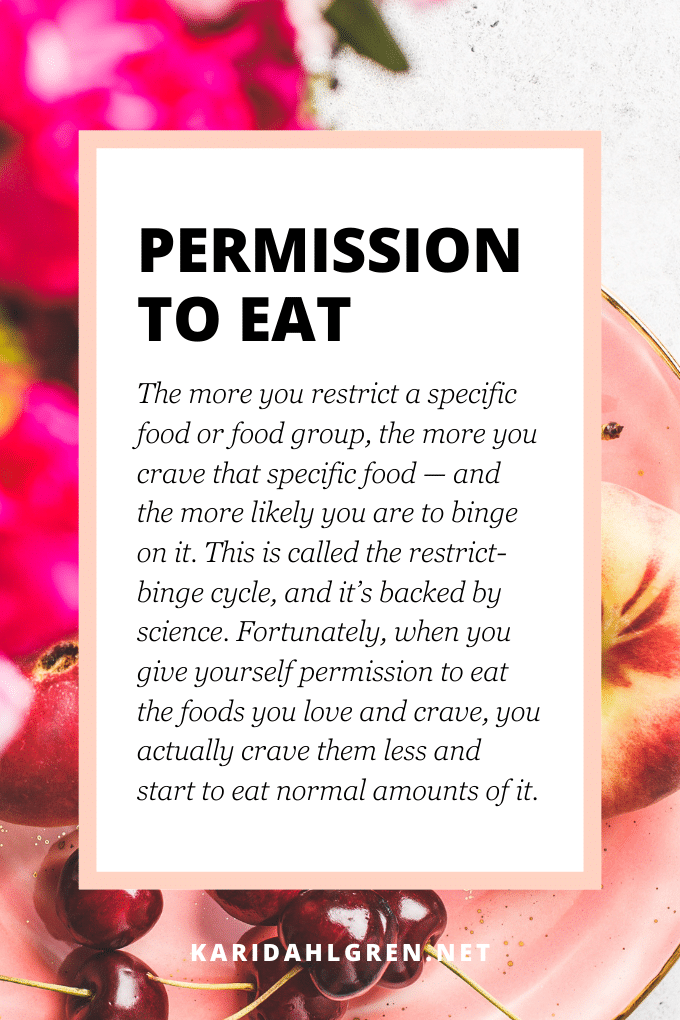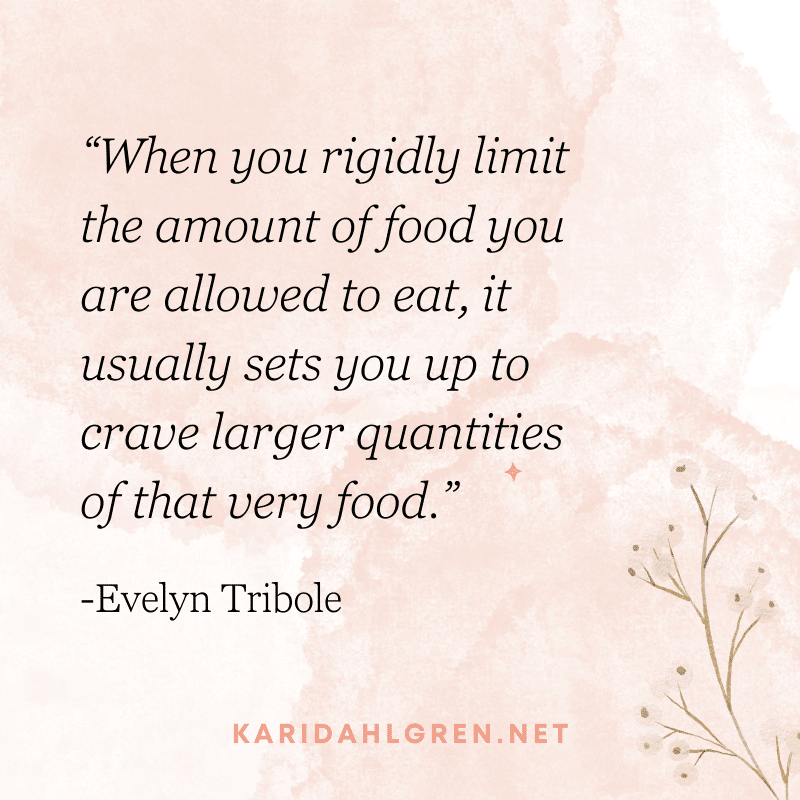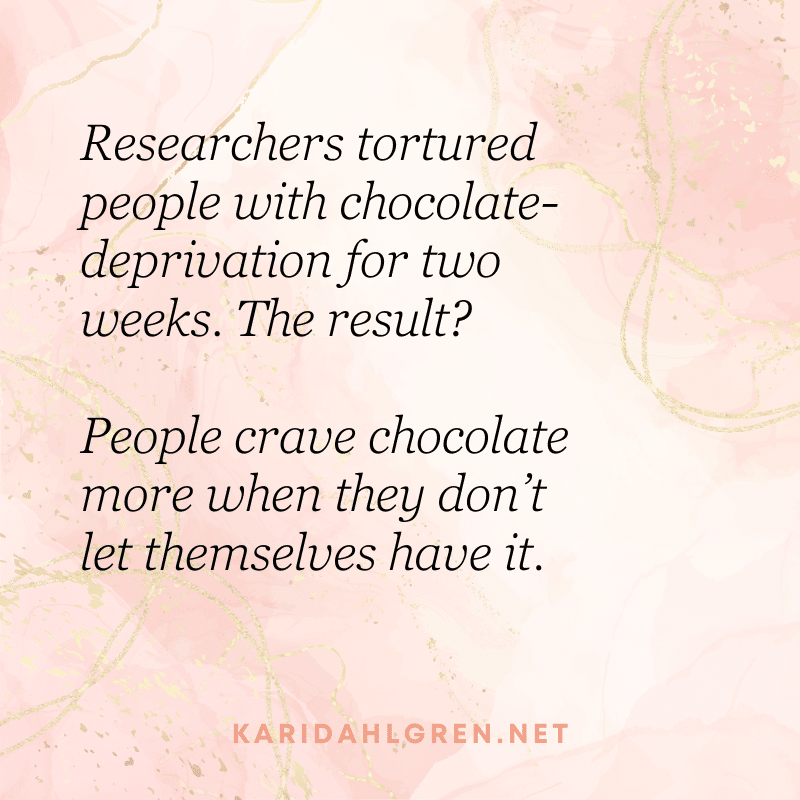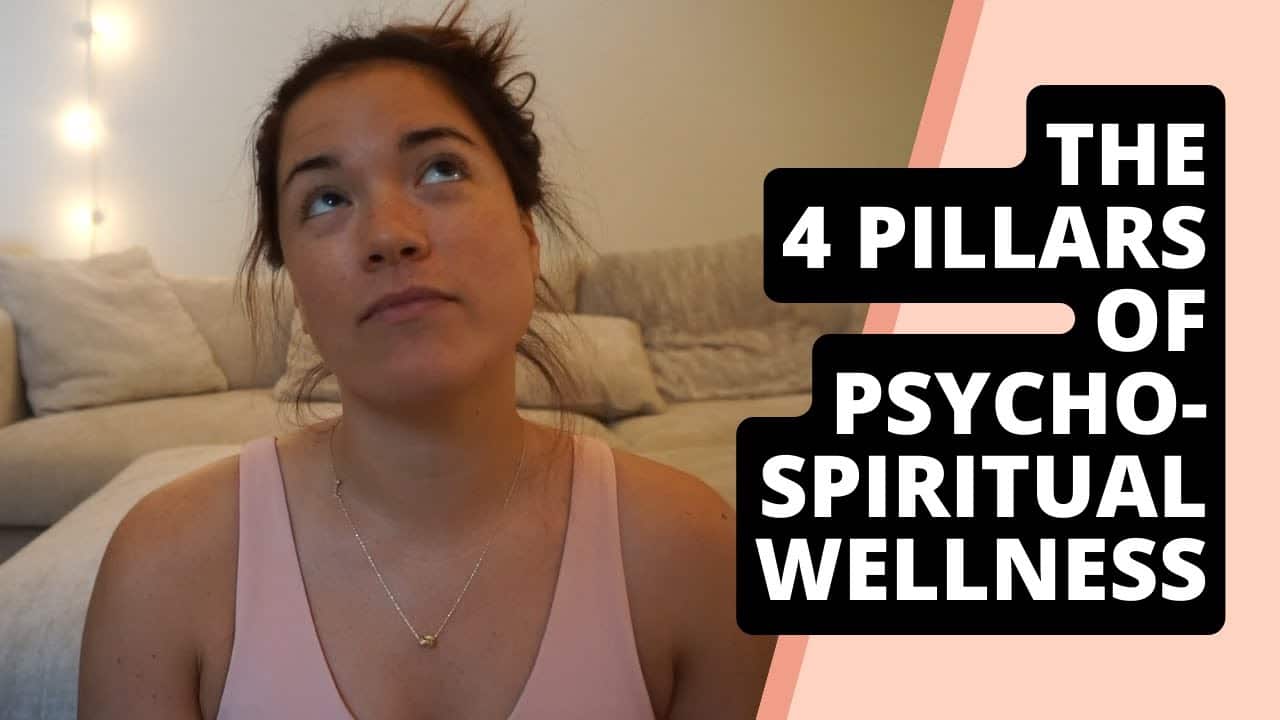
Without permission to eat the foods that genuinely satisfy you—you’ll end up compulsively eating them anyway, likely in greater quantities. Have you ever noticed that limiting carbs often ends in a binge on pasta and pizza? Or that limiting your sugar intake somehow makes a dozen glazed donuts sound really good?
When we restrict certain foods and make them off-limits, we are more likely to binge on them, according to a study published in the reputable journal Appetite.[1] Intuitively many of us know that every restriction is followed by out-of-control eating, and I hope it inspires self-compassion to see this pattern documented by clinical evidence.
I was trapped in this restrict-binge cycle back when I was attempting to lose weight by dieting and counting calories. At the time, I thought it was just a lack of willpower, but now I know better. Now that I’ve dug into the psychology behind overeating, it makes perfect sense why restricting certain foods actually makes you crave those foods even more.
Today we’re talking about why permission to eat is essential for being able to stop eating when you’re full. If that sounds like a nice goal, then let’s dig in.
Restricting Your Diet Actually Primes the Body for Overeating and Weight Gain

Have you ever experienced the vicious cycle of yo-yo dieting before? “Eating well” for a period of time only to “fall off the wagon” and break your diet? While it might seem like a lack willpower, it’s actually the result of not giving yourself permission to eat the foods you find satisfying.
Many people restrict their diet for the purpose of weight loss; yet an enormous body of clinical evidence shows that restriction is linked with long-term weight gain—and it isn’t due to poor willpower.[2], [3], [4] Dieting triggers biological adaptations that actually increase cravings for high-calorie foods—the very foods often placed off-limits on a diet.[5]
Your body is wired to survive. When calories are restricted, your body adapts by increasing hunger-regulating hormones (ghrelin) while decreasing fullness-regulating hormones (leptin).[6] The result: you binge on “junk food” after a week of dieting because you feel hungrier and have more cravings than usual.
Unfortunately, the vicious cycle is merely getting started at this point. When you consume less calories than you need, your metabolism also slows down to conserve energy, which means you don’t need as many calories to function.[7]
Unfortunately, this metabolic shift—a process known as adaptive thermogenesis—increases the likelihood of storing that excess energy as fat.[8] This is why you shouldn’t compensate for overeating by undereating; it disrupts your metabolism and primes your body for weight gain, not weight loss.
Your body is wired to rebel against dieting and resist weight loss in the setting of restriction; a fact that the diet industry profits from down-playing.
Without Permission to Eat, Your Psychology Rebels Against Food Rules Too
The importance of giving yourself permission to eat goes beyond biology, too. Research shows that the more we restrict certain foods, the more we psychologically crave them as well.[9], [10] People often want what they can’t have, and clinical evidence validates this psychological theory.
But what if you aren’t trying to limit your calories to lose weight? What if you’re just trying to improve your health by making “unhealthy” foods off-limits?
To answer this question, researchers took a food that most of us love – chocolate – and analyzed what happens when people restrict it while still eating a normal amount of food. The results? People who already have high cravings for chocolate felt even more cravings for it when they made it off-limits![11]

Calories were not restricted in this study—only chocolate was. This study removed the layer of biology to illustrate how the rebellious effects of restriction can be purely psychological sometimes.
In this light, it’s no wonder that a dozen glazed donuts suddenly sound so much better after placing carbs and sugar off-limits. Even if you would normally be satisfied by just one donut, placing beloved foods off limits makes you crave even larger quantities than before.
The Barrier to Letting Go of Food Rules: A Fear of Weight Gain
See if you agree with the following statement:
If you eat when you’re hungry, enjoy exactly what appeals to you, and stop when you’re full, then your weight will regulate itself.
Do you think this is true? Intuitively, many might agree. Yet, there’s a prevailing fear that unrestricted eating could spiral into eating so much food that you gain weight.
To help quell this fear, look no further than set point weight theory, which suggests that your body rigorously defends a weight within its natural range.[12] Remember the study I referenced earlier showing that dietary restriction causes the body to adapt and trigger cravings?[5] That was in response to restricting your diet in attempt to lose weight.
Although it can be frustrating to experience weight regain after dieting, your body also works in the opposite direction: it can resist weight gain in response to overeating as long as you aren’t also restricting.[13]
Your body is constantly striving to maintain homeostasis, or a state of balance. Studies show that momentary bouts of overeating are offset by metabolic changes that help limit further weight gain and maintain the body’s set point weight.[14]
Under conditions of excessive dieting, however, the body’s set point weight often settles higher, not lower.[13], [14] You’re more likely to gain weight when you restrict your diet—not when you give yourself permission to eat and enjoy the foods that you love and crave.
How to Give Yourself Permission to Eat While Avoiding Overeating
Still, there’s more to stopping overeating than giving yourself permission to eat. While you cannot stop overeating without giving yourself permission to eat the foods you love and crave, let’s discuss the other necessary steps as well.
My approach to stopping compulsive eating, Psycho-Spiritual Wellness, has 4 pillars: stop dieting, feel your authentic discomfort when you want to eat without hunger, address the limiting beliefs that drive self-sabotage, and make sure you’re eating enough.

The third pillar—identifying the limiting beliefs that drive self-sabotage around food—is not as relevant for embracing permission to eat. However, the other three pillars are excellent steps.
1. Stop Dieting & Give Yourself Permission to Eat
First things first, try to let go of the food rules and embrace all foods as equal. Let go of the idea that some foods are ‘good’ and others are ‘bad’ and instead find peace knowing that all foods fit into a balanced diet.
It wasn’t until I gave up dieting that I finally stopped binge eating. When I stopped restricting, I cut off the restrict-binge cycle at its source. Kicking the food rules wasn’t a smooth process though, and I was afraid of weight gain once I let go.
However, I was pleasantly surprised that even though I was eating some of my previously off-limits foods, I was eating normal amounts of it.
Instead of eating an entire sleeve of cookies late at night, I was enjoying a normal serving of cookies after dinner. To me, this was a huge step in the right direction.
Please don’t assume that giving up dieting is easy. I speak about it candidly because it was over seven years ago, but at the time, I was riddled with fear and anxiety. Fortunately, I found the benefits of embracing permission to eat far outweighed the fear of gaining weight.
If you also struggle with fear and anxiety around giving up dieting, it helps to familiarize yourself with the stages of giving up dieting. The second stage is the “Rebel Binge” phase where you’re prone to overeating your once-forbidden foods.
While it may sound formidable, it is a rite of passage for many people, especially those with long histories of restriction. As long as you stay fully committed to allowing all foods, you will move through the stages of giving up dieting and onto a better relationship with food.
2. Feel Your Authentic Discomfort When You Want to Eat Past Fullness
A tool that helped me navigate the stages of giving up dieting, and what truly set my journey up for success, was the Stop, Drop, & Feel®. The premise behind my trademark method for stopping compulsive eating is that uncomfortable feelings are strongly associated with eating past fullness.[15]
By making space for these emotions—which I call your authentic discomfort—the desire to eat past fullness often goes away. When I first started using the Stop, Drop, & Feel, anxiety and loneliness cropped up more than I would like to admit; but it was an authentic discomfort. Instead of struggling with the inauthentic discomfort of dieting and restriction, I was dealing with my Real problems.

However, permission to eat is critical for the Stop, Drop, & Feel to work! This step makes the ‘stop’ accessible as many people who struggle with binge eating often feel too much momentum during a binge to stop. Fortunately, the element of permission is powerful enough to make it accessible to at least pause a binge temporarily.
The next time you want to eat when you’re already full, stop and promise yourself that you can eat the food you’re craving if that’s still what you want after the Stop, Drop, & Feel is over. But first, go to another room and drop into your body. Then, get curious about how you’re feeling.
Nine times out of ten, the desire to eat without hunger will go away. However, if the craving doesn’t go away, it’s very important to honor the element of permission to eat, otherwise the Stop, Drop, & Feel becomes another form of restriction and it simply doesn’t work.
3. Make Sure You’re Eating Enough
Believe it or not, a necessary step for embracing permission to eat is making sure that you’re allowed to eat enough. Unfortunately, not many of us know what enough actually means.
Diet culture has normalized eating less—so much that we think 1,400 calories is normal. It isn’t. In fact 1,400 calories is the recommended daily intake for a toddler.[16] However, a culture of eating less has warped our perception of what “enough” really is.
Many of us are afraid of eating a normal amount of food due to the fear of weight gain, but remember the study I presented earlier about how restriction slows your metabolism?[7] The good news is that it also works in the opposite direction: eating enough helps heal your metabolism when you’re normalizing your eating after excessive dieting.
Eating enough also helps reduce your body’s preference to store excess energy as fat. This means that your body may favor releasing weight instead of gaining it.[14]
Permission to Eat = Permission to Thrive
Giving yourself permission to eat the foods you love and crave is the first step towards healing your relationship with food and stopping overeating—not the other way around. Granting permission helps get the biological and psychological rebellion to restriction out of the way. The result is often eating less than before.
However, eating less is often not the goal! You want to heal your metabolism by eating normal amounts of food, that way your body settles upon its natural weight instead of a falsely inflated set point weight (due to excessive dieting).
Focus your energy on the psychology of eating through practices like the Stop, Drop, & Feel, and you’ll be well on your way to stopping compulsive eating while still enjoying the foods you love and crave. That certainly sounds like a sustainable solution to me.




Hello, I just wanna say your blog has been helping me so so so much!
I keep trying to remind myself that I can eat whatever I want whenever I want, and while that’s still a little scary, I’m a lot more flexible with what I eat and I’m noticing that I’m still drawn to healthier food, even though I know I can have the burger if I really wanted it..
I’m also noticing that I’m a lot more mindful while I eat, I really try and enjoy the experience, eat slower, feel the texture and be mindful of the taste.
My food rules still come up and I make sure to challenge them, however some of them are so engrained in my head that I don’t even realise they’re actually rules/obsessions!
In addition to all this, I’m consciously trying to make sure I feel my feelings when they arise, and I’m hoping to start doing rebirthing and maybe seeing a therapist in order to uncover any past trauma that could’ve been playing a role..
There is one thing I’m struggling with though, and its my hunger and fullness cues. Do you have any tips on how to tell whether I’m actually hungry/full? I always ask myself whether I’m truly hungry or whether I’m trying to block/avoid an emotion or something… It works sometimes but reading my hunger/fullness cues in general is quite challenging for me.
I also wanted to ask if you think its a good idea to log what I eat, at least in the beginning.. I deleted myfitnesspal and haven’t been calorie counting but I’m logging what I eat in addition to how I felt before/while/after I ate. Should I stop this too?
Looking forward to hearing back from you, your help would be much appreciated!
I’m absolutely in love with your work and incredibly grateful I found you.
Thank you from the bottom of my heart
G
Hi G! First of all, thank you so much for your kind words!! I’m so glad my free resources are helpful. Here are some answers. (RE: hunger) I would focus on emotional check in when you feel confused by hunger. Almost like doing a preemptive Stop, Drop, and Feel. You’ll get back in touch with the physical sensations of hunger with practice, and I find that focusing on emotion helps too. (RE: logging your food) I LOVE that you are logging your food and feelings. I think it would be a mistake to log calories, but logging your feelings before and after you eat is AMAZING and actually an exercise that I recommend to clients. Keep this up sister!! I wish you luck as you continue on this journey!
I wasn’t sure this was a path I wanted to explore but today it clicked so I thank you. I was hungry and wondering through my kitchen, I found a piece of fruitcake left in the freezer from the holidays. I ate the piece didn’t feel guilty and I was able to ignore any further cravings. This has never worked before. Stop, drop feel. You are amazing. I am anxious to learn more.
Thanks for the comment Loretta! I am impressed that you were able to bypass the guilt and embody the Permission to Eat so quickly! That’s amazing! I hope you’re on my Tuesday newsletter — because that’s where I send my best stuff! See you in your inbox. 🙂